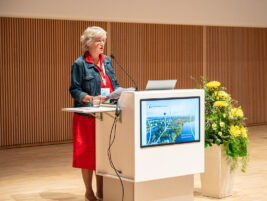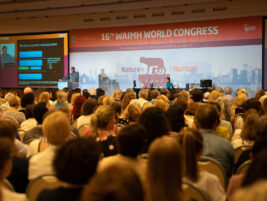Welcome to this Summer (2024) edition of WAIMH Perspectives in Infant Mental Health. It has been a very busy period since the last issue, with Astrid Berg now having been formally invested in her new role as WAIMH president at the Interim WAIMH World Congress for Infant Mental Health that was held in Tampere, Finland in June. We have also recently received very sad news of the death of Professor Colwyn Trevarthen, Emeritus Professor of Psychobiology and Child Psychology at the University of Edinburgh (Scotland), who died on July 1st at the age of 93. To honour Colwyn fully, Hisako Watanabe (WAIMH Regional Vice President) and Campbell Paul (WAIMH Past President) are in the process of compiling a reflective tribute to Colwyn, a treasured friend and colleague. In the interim, Salisha Maharaj and Maree Foley, from the Perspectives team, have compiled for this edition of Perspectives, a selection of infant mental health and early childhood development-focused academic and free open-source resources where Colwyn Trevarthen is the author or co-author.
We have three IMH clinical papers for you in this edition. The first of these – The World in Crisis – what would infants say to us? Development and Context – is based on Astrid’s keynote address as the new WAIMH President, which is an erudite and emotional call to action to ensure that we hear the voice of the infant whose early experiences are very often the trauma of wars, displacements, hunger, earthquakes and floods. She examines the research of number of scientists – Piontelli (1992); Marx & Nagy (2015) Frohlich et al (2023)– whose work during the perinatal period has enabled us to better understand the meaning of fetal behaviours. She goes on to examine what scientists such as Meltzoff and Borton (1979) and Stern (1982) have taught us about ‘the infant in the world’ in terms of their early abilities (i.e. amodal perception) and the importance of their primary caregivers in enabling babies to come into being.
Our second paper is an opinion piece written by Professor Kai von Klitzing “There are many roads leading to Rome”. Growing up in a diverse world; does everything work in child development?, which provides a thought provoking and challenging examination of the tension between a culturally sensitive approach to infant mental health based on the many diverse pathways to mental health that are now recognised, and the danger that this poses in terms of us moving toward what he refers to as ‘cultural arbitrariness’ in which all cultural practices are felt to be equal in terms of child development. He demonstrates this by examining recent trends in relation to modern reproductive medicine, and culturally different definitions of child maltreatment.
Our third paper, which was written by Bridget Walsh, with Avis Moore, Chantell Whaley, and Milagro Guardado entitled Promoting Reflective Coaching for Home Visitors’ Regulation and Practice: an Autoethnographic Account provides a personal examination of the role of early childhood home visiting coaches in the U.S. In this autoethnographic account, Bridget shares and analyzes her journal entries made as part of an infant-parent mental health fellowship alongside the stories that she compiled about her own experiences of receiving support in her role as a coach, and interviews with HVs that were undertaken to promote her reflexivity. Her paper describes how she used this approach to explore the contribution of reflective coaching to adult regulation and educational and therapeutic transformation.
In addition to the clinical papers, we report the nominees and winners of both the Scientific and Clinical Poster Awards from the WAIMH interim Congress which was very well attended with over 422 delegates from 36 countries. The call for poster presentation submissions in the scientific and clinical categories received over 200 submissions, and here we present the three that were rated as top in each category.
We also report in this edition of Perspectives the result of a survey that was sent to all WAIMH members, with 129 responses in total. The report shows members views regarding how frequently they access Perspectives, their preferred article format, the usefulness of the content and the likelihood of them submitting a paper, with key reasons for not doing so. It also highlights the future topics that members would like us to cover.
We conclude with a note from WAIMH Executive Director Kaija Puura, and some news from WAIMH Executive Office.
The issue closes with general information about WAIMH Perspectives (including the paper submission process). As a reminder, Perspectives papers can be accessed online, with past issues dating back to 1993 currently available by following this link: https://perspectives.waimh.org/perspectives-archive/. Also, past articles are available online in text format, which in turn can be shared: https://perspectives.waimh.org/.
With all good wishes,
The WAIMH Perspectives in Infant Mental Health editorial team
Jane Barlow, Editor-in-Chief, United Kingdom
Salisha Maharaj, Assistant Editor, South Africa
Maree Foley, Associate Editor, Switzerland
Jody Todd Manly, Associate Editor, United States
Azhar Abu Ali, Associate Editor, United Arab Emirates
Patricia O’Rourke, Associate Editor, Australia
Joy Osofsky, Associate Editor, United States
Harleen Hutchinson, Associate Editor, United States
Michelle du Plessis, Associate Editor, South Africa
Nicki Dawson, Associate Editor, South Africa
Lauren Keegan, Editor, Australia
Veronica Mestre, Intern Editor, United States
Neea Aalto, Production Editor, Finland
Perspectives in Infant Mental Health Vol. 32 No. 2 | Summer 2024
Authors
Jane Barlow (United Kingdom), Editor-in-Chief
Maree Foley (Switzerland), Associate Editor
Salisha Maharaj (South Africa), Assistant Editor








